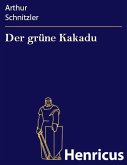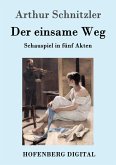Der grüne Kakadu Arthur Schnitzler - "Das Stück ist ein Schmiß! Wenn mir so was einmal 5actig gelänge, könnt ich und die Literatur froh sein"? so Schnitzler begeistert über seine in der Tat hinreißende Groteske: Die Bessergestellten von Paris treffen sich ohne dies ahnen zu können am Vorabend der Französischen Revolution in der titelgebenden Kneipe, um sich von Berufsschauspielern Halb- und Verbrecherwelt vorgaukeln zu lassen bis unaufhaltsam-tödlich das reale Revolutionsgeschehen in den "Grünen Kakadu" hineinschwappt. Das hochvirtuose Spiel mit falschen Erwartungen, Fiktionalität und Realität gehört zum amüsantesten und gleichzeitig geistreichsten, was die deutsche Literatur zu bieten hat.
Dieser Download kann aus rechtlichen Gründen nur mit Rechnungsadresse in A, B, BG, CY, CZ, D, DK, EW, E, FIN, F, GR, H, IRL, I, LT, L, LR, M, NL, PL, P, R, S, SLO, SK ausgeliefert werden.









